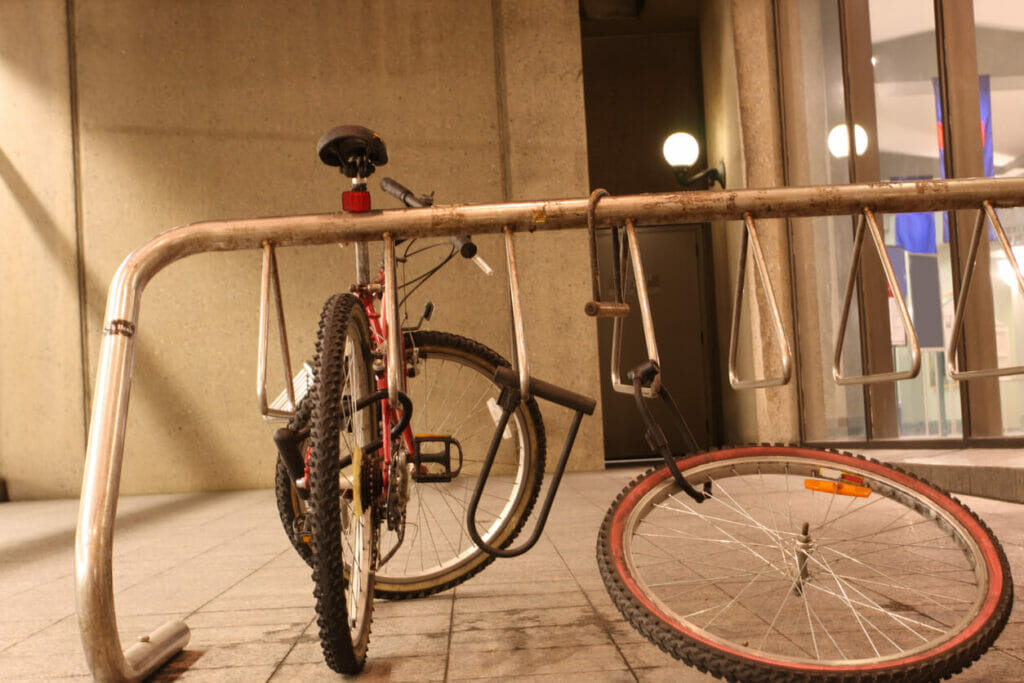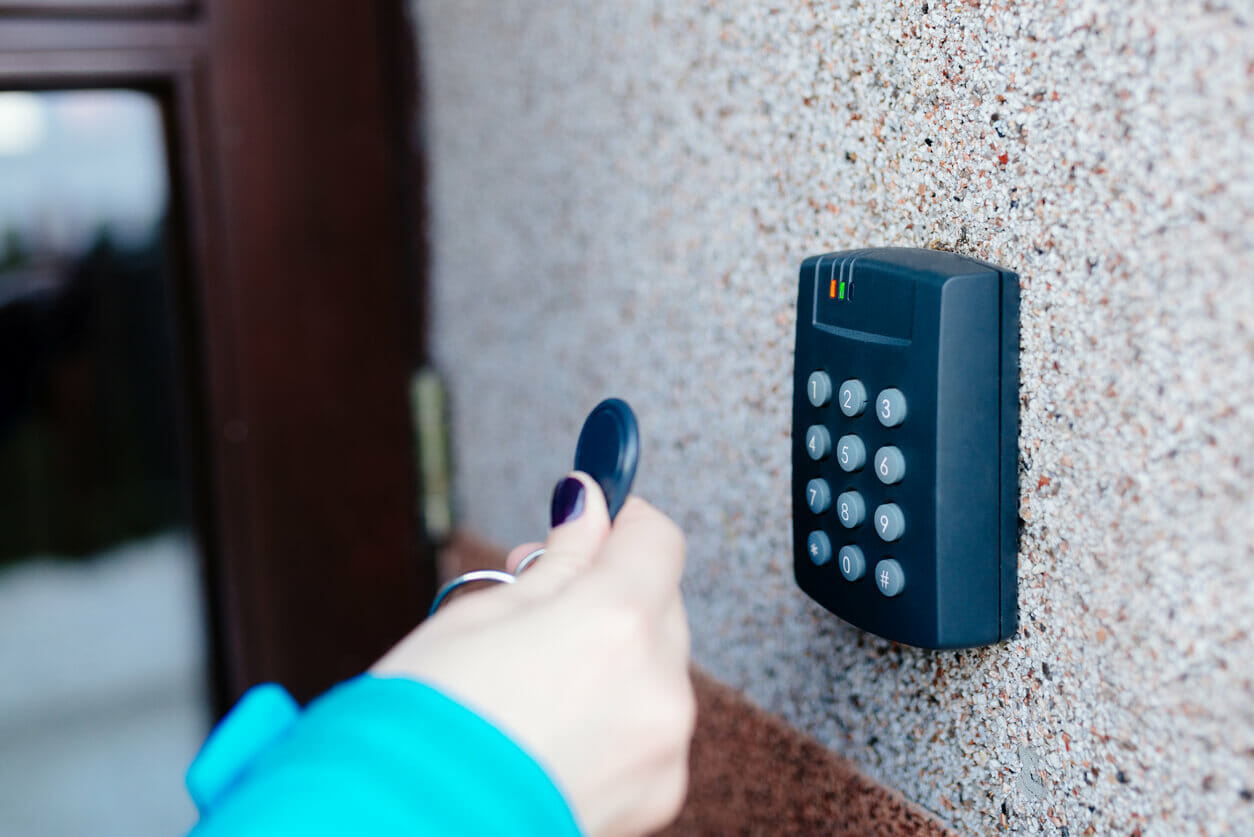If safety were your top priority, would you choose to live in a condominium, or a single-family home? Despite the fact that hundreds of people pass through condo developments each day, multi-unit buildings are generally safer than ground-level homes.
There are several reasons for that. First of all, it’s harder for a criminal to sneak in and out of a unit with so many neighbours in such close proximity. The culprit will have a much harder time blending in or hiding from others in the hallway.
Table of contents
Condo buildings may also have cameras, especially if they are newer. Cameras are generally installed around the perimeter of the building, in the lobby, in parking garages, and in elevators. The chances of a thief being caught on more than one camera are high (though many homeowners have now elected to install their own cameras).
And then there’s the possibility of being apprehended by security or concierge. If an issue does occur, there is someone on the property who will respond right away. Homeowners have to contact local authorities, and won’t get immediate assistance.
So in short, condominiums are very safe. But there are things that both management and residents can do to further reduce threats to safety. Read on to learn about some effective strategies.
Different types of threats
Safety and security mean different things to different people. Condo tenants generally worry about theft since these types of crimes occur in multi-unit communities most often. But those aren’t the only threats that managers need to think about.
Internal dangers (owners and tenants)
People belonging to a building can pose a danger to staff or other residents. Condominiums have a duty to protect directors, managers, staff, and owners, but unfortunately, there are plenty of stories and increasing court cases involving abusive owners and depleted managers.
While there are instances of owners acting dangerously towards other members, it’s usually the staff who are subjected to verbal and physical abuse.
Too many condo managers are experiencing burnout and abuse, which is causing them to leave the industry altogether.
Condos need to have a workplace harassment policy in place, and ensure that it is enforced so that management does not have to operate in a toxic workplace.
In-suite burglaries
Thieves don’t usually target a specific unit when stealing from a condo. Condo theft is an opportunist crime, meaning criminals will try doors randomly until one opens.
Alternatively, if they have been in the building before, a temporary contractor may have spotted a poorly hidden master key and attempt to swipe it when the front desk is unattended.
Residents should always be mindful of locking their doors when they go out. And condos need to make sure they are using secure key-locking solutions.
Car and/or bike theft
This type of crime may be the most problematic for condo communities. Sometimes, car or bike thefts are premeditated, but much of the time, the thief looks for an easy opportunity. They often follow residents through parking garage doors or gates, pretending to live in the building. They may not even steal anything on the first attempt, but will take time to look at what’s available and what the best escape route would be.

All access points to car and bike garages should be gated and/or secured. While barriers won’t keep pedestrians out, it’s better to have some access control than nothing at all. Bike rooms must also have access control technology, such as FOBs. Keeping racks out in the open is not as safe as having a locked room for bicycles.
Fires, floods and other disasters
Condo residents don’t find themselves in emergency situations often, but if they are not prepared to respond to an incident, they could end up getting hurt.
People who live 10 or 20 floors above the ground must know what the best and safest escape route is, as well as alternative options for making it out safely. It’s up to the corporation or association to form effective evacuation plans and share those plans with members.
Security solutions
To enhance condo safety, leaders and decision-makers can employ some of the following security solutions. This section will focus on the more common threats created by strangers as opposed to those caused by residents or natural disasters.
Conduct security risk assessments
Condo communities cannot create effective security plans if they are unaware of the problems or threats they face. That’s why every building should start by hiring a professional company to conduct a security audit or risk assessment.
The results of this study will help you determine strengths and weaknesses, and what steps to take next. A risk assessment will also help you create security goals that will benefit your community. Every condo building is different, and depending on the demographic, location, size, and age of the building, the risks will vary.
Security guards
Hiring dedicated guards to oversee security is a smart investment. But some condos are apprehensive about doing this because it is a more costly solution than simply installing cameras.
But surveillance cameras cannot stop an incident from occurring – though they may make people think twice about doing something they shouldn’t.
Guards, on the other hand, can move around at a moment’s notice and prevent a potentially dangerous or rambunctious event from occurring. They can also complete pre-scheduled patrols in high-risk areas such as parking lots, stairwells, and hallways to minimize the frequency of vehicle thefts, vandalism and break-ins.
Concierge
Concierge may perform some of the duties of security guards, but also do more in the way of customer service. It’s a hybrid option for condos that want help with security, but don’t need such an intense presence. For example, concierge staff could monitor cameras and help manage parcel deliveries. If they spotted suspicious activity within the building, they wouldn’t necessarily try to intervene, but they could contact local authorities right away.
Security camera systems
Security cameras can be a great secondary security tool for condominiums. As mentioned earlier, cameras can’t do anything to stop incidents from transpiring, but they can deter unwanted behaviour. They can also provide evidence to condos after a crime has occurred, but footage is not guaranteed to help authorities find the perpetrator. In order to be most effective, cameras should be paired with good lighting and clear views of the area being monitored. Condos should also install signs to let people know they are being recorded. If criminals are unaware that they are being monitored, they will continue with whatever activity they planned to carry out.
Access control systems
Access control is another important secondary security tool. While they won’t stop people from tailgating, these security systems can limit the number of unauthorized individuals who enter a condo building or parking garage.
Access control systems may include buzzers or camera verification systems for residents to let guests in, FOBs, gates, ID badges, and passcodes.
Tips for condo management
The management team may find some of these suggestions useful when creating a plan that will maximize security and safety for their community.
- Ensure that the main outer doors remain locked during “off hours”
- Make sure that only the first initial and last name of residents appear on lobby directories and mailboxes
- Consider installing pick-resistant deadbolt locks, or freewheeling cylindrical levers that are abuse-resistant
- When selecting door hardware, look for trusted certifications by the American National Standards Institute (ANSI) or Builders Hardware Manufacturers Association (BHMA)
- Security cameras can be effective, but they won’t solve problems on their own and they still need to be monitored by someone
- If a crime occurs on the property, inform residents immediately. You might have witnesses come forward, but publicizing these incidents also provides you with an opportunity to educate residents about basic safety practices
- Replace dead lights as soon as possible. Lighting is a very simple way to help prevent crime and increase safety in the building
Tips for residents
Residents can implement these simple suggestions to keep themselves and their valuables safe.
- Always lock your front door, even if you’re just running to the store
- Keep balcony doors locked at all times when not in use
- Lock your vehicle and remember to remove valuables
- If possible, store expensive bikes on your balcony instead of leaving them in a communal storage area
- When going on vacation, cancel or redirect your mail and deliveries, or arrange to have someone who you trust pick up your mail
- Despite all the safety precautions you might take, unfortunate events still happen. Purchase renters insurance just in case you need it


